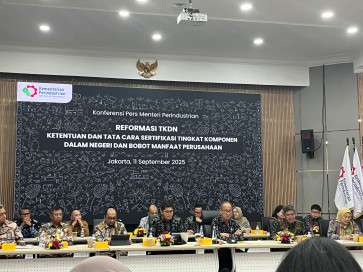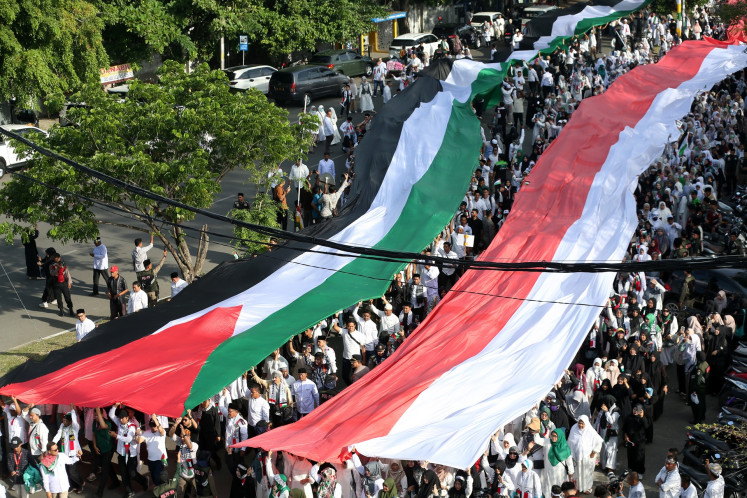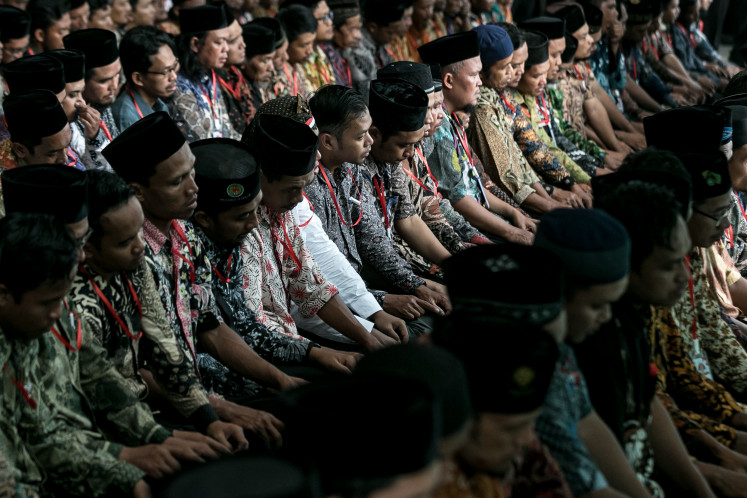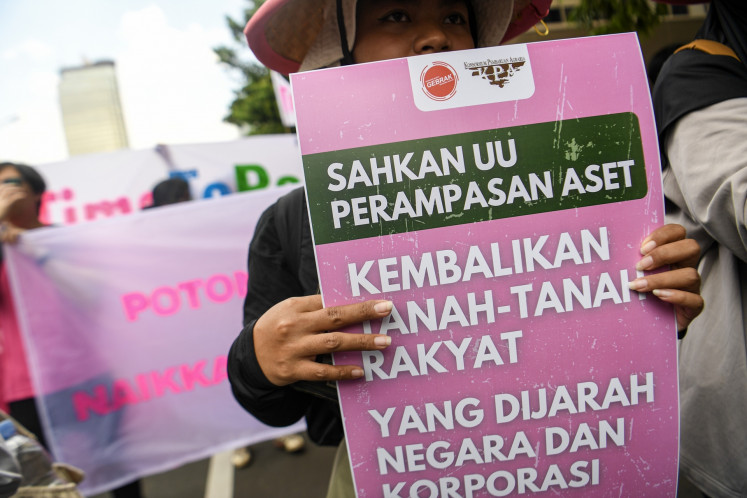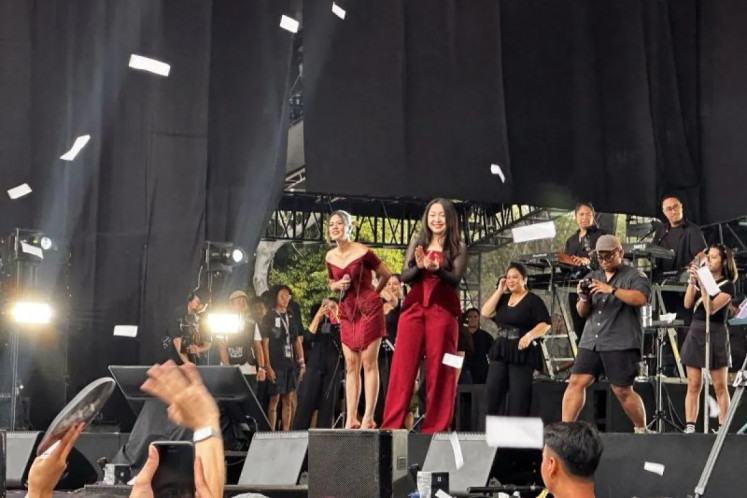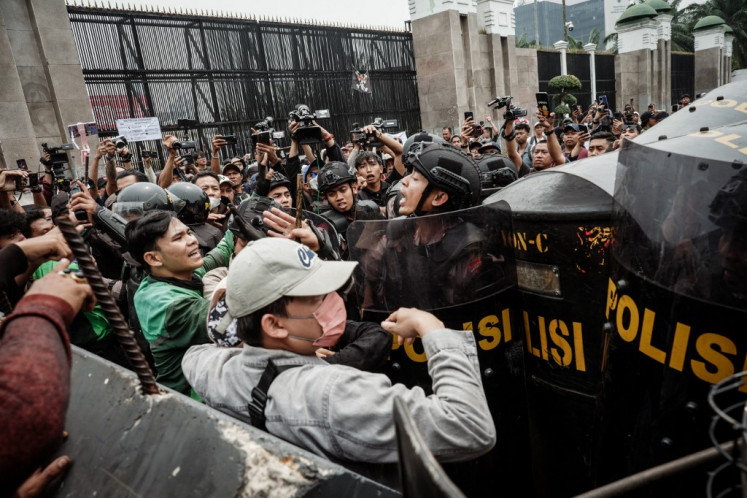Popular Reads
Top Results
Can't find what you're looking for?
View all search resultsPopular Reads
Top Results
Can't find what you're looking for?
View all search resultsUnderstanding Indonesia through literary festivals
With Indonesia as the Guest of Honor at the 2015 Frankfurt Book Fair, for example, people like myself who had never heard of Indonesian literature before, suddenly begin to see its potential on the world stage.
Change text size
Gift Premium Articles
to Anyone
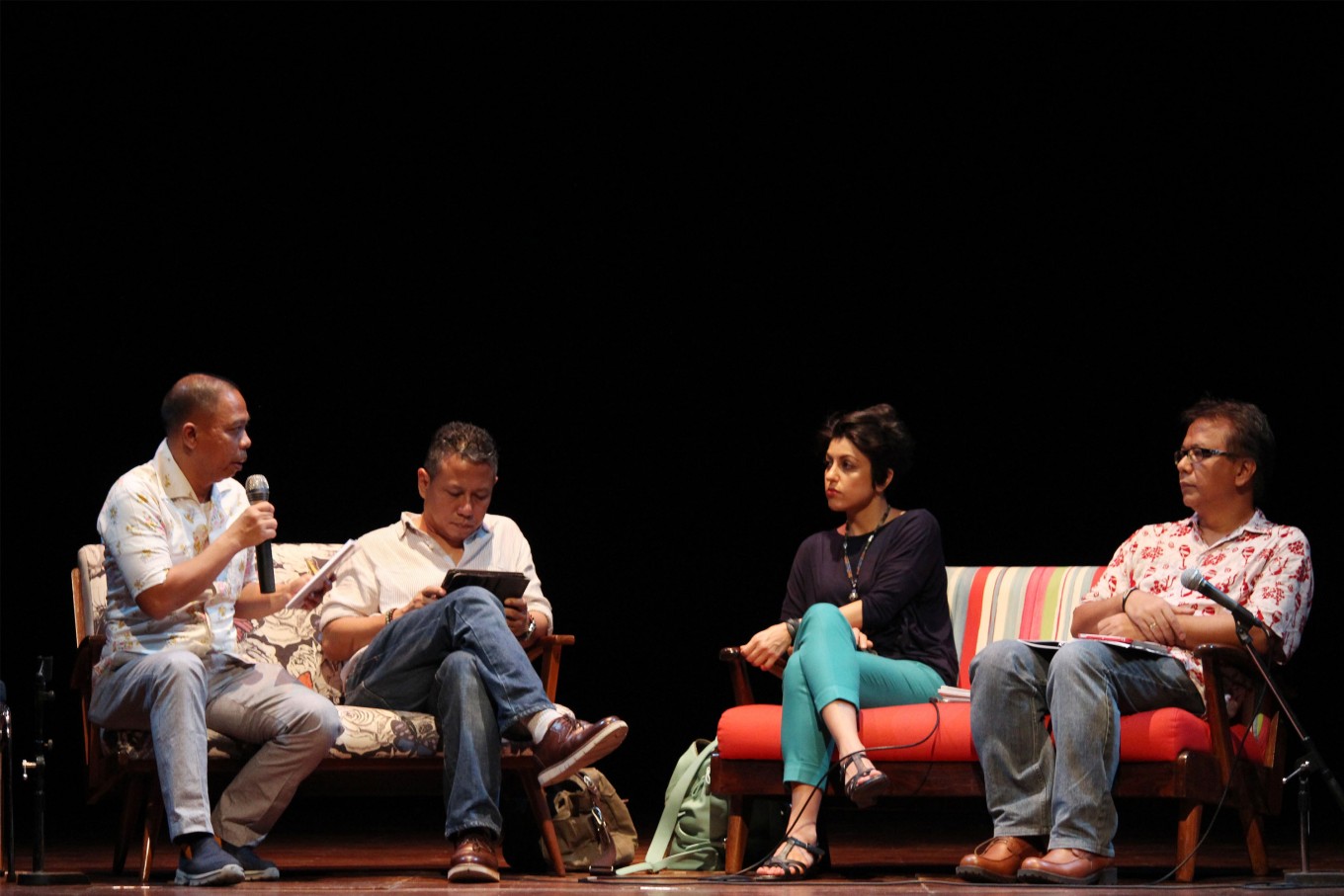 (Left to right) Abdul Khalik, the moderator, Nirwan Dewanto, poet and literary critic, Sanaz Fotouhi, assistant executive director of Asia Pacific Writers and Translators and Endy Bayuni, editor in chief at The Jakarta Post, talk during a discussion entitled "Media and Literature" at the 2016 ASEAN Literary Festival in Jakarta on May 8. (JP/Viriya Paramita Singgih )
(Left to right) Abdul Khalik, the moderator, Nirwan Dewanto, poet and literary critic, Sanaz Fotouhi, assistant executive director of Asia Pacific Writers and Translators and Endy Bayuni, editor in chief at The Jakarta Post, talk during a discussion entitled "Media and Literature" at the 2016 ASEAN Literary Festival in Jakarta on May 8. (JP/Viriya Paramita Singgih )
I
n May I came to Indonesia to investigate the country’s literary landscape in an effort to bring the Asia Pacific Writers and Translators’ annual event to Jakarta in 2017.
Yet, I returned to Melbourne with far more than connections to run next year’s event. As someone who knew very little about Indonesian literature, I came to understand the various literary events and people’s passion for literature in a country where, apparently, literature and reading do not take high priority.
My journey took me to Jakarta and also to Makassar, South Sulawesi, where two rather new literary festivals embrace and reflect the people’s changing relationship with literature. This relationship is perhaps often not seen in and beyond Indonesia.
I landed in Jakarta — the “big durian” according to Harry Aveling, the Australian lecturer and translator of Indonesian literature — to attend the third ASEAN Literary Festival ( ALF ). The festival’s atmosphere and theme reflected Harry’s metaphor: controversial, stinky for some, flavorsome for others, a city in which matters of the heart and the mind seem to coexist harmoniously, but at a seemingly cool distance.
ALF is Jakarta’s only international literary festival aiming to bring together writers, translators and cultural practitioners from Southeast Asia. This year, it began with a juicy controversy: the heavy presence of the police, threatening to shut down the event because of panels on 1965 and on the lesbian, gay, bisexual, transgender and queer ( LGBTQ ) issue.
Yet, defiant festival directors refused, and the event opened with former Timor Leste president Jose Ramos-Horta’s talk on human rights. Even the seemingly unpalatable LGBTQ panel was devoured fully by the audience.
The complications of telling “The Story of Now” — the theme of the festival — were reflected throughout the four days, as young police officers crowded the main hall at Taman Ismail Marzuki, while national and international writers and cultural practitioners shared ideas and discussed sometimes-controversial issues. Among the panels, Finnish Ambassador Paivi Hilunen-Toivio, The Jakarta Post’s Endy M. Bayuni and translator John McGlynn discussed why data present Indonesia as almost the last country that reads.
That Indonesians should be so disinterested in books was surprising. On the surface, it did not seem like that. Throughout the ALF, well-read local audiences packed the sessions and actively participated. Events were sold out, queues were long, and there was excitement in the air that I have not felt at any other literary festival.
Attending the Makassar International Writers’ Festival ( MIWF ) made it even harder for me to believe the statistics I had heard earlier.
The Makassar festival was founded and directed by Melbourne-based Indonesian writer Lily Yulianti Farid and flies on the wings of volunteers. Spread out over multiple venues, including the famed Fort Rotterdam, and several universities, the sixth Makassar fest gathered some 15 international and nearly 50 local writers. It aims to put regional and lesser-heard Indonesian narratives center stage.
And in doing this, with the theme “Baca!” ( Read! ), the festival apparently encouraged a new engagement with books and reading. Here, reading was not limited to formal panels and discussions in cool rooms. Rather, it was a hot, passionate family affair.
The Fort’s entire grounds were transformed into a huge library, with cleverly designed reading stations laid out across the lawn. Young families, students and passers-by got to flip through books and mingle informally with international and Indonesian writers.
Visitors did not hesitate to sit outdoors or in the Fort’s hot historic rooms to listen to readings, poetry and discussions, while beads of sweat covered them.
They watched, fanning themselves, as the award-winning Eka Kurniawan launched his book O, Deborah Emmanual and Aliya Gabers read passionate poetry bringing people to tears, and the defiant travel writer Agustinus Wibowo did a workshop on photography and writing, among other programs.
In the evening, the grounds were transformed into an outdoor family fair. Hundreds circled to listen to a “Cup of Poetry” every sunset as famous Toraja coffee was served to readings by local poets. People sat on the lawn to be entertained under the stars. Even a little rain was not enough to cool people off. Here, cool distance was not encouraged.
After all, that had been Lily’s vision for this festival. In her opening remarks, she stated that this festival was for the community, ran by the community entirely free, and it was her way to encourage engagement with literature and reading.
The festival visitors were indeed only a small, selected fraction of Indonesia’s population. And 20 days is surely not enough for me to claim any full understanding of Indonesia’s literary landscape. Yet I witnessed the importance of these festivals in engaging Indonesia and its people, and those beyond, with its literature.
While the famous Ubud Writers and Readers Festival in Bali has already brought some interest to Indonesia through engagement with literature, relatively new international festivals like the ALF and the MIWF show the beginning of a changing trend in literary interest both in Indonesia and beyond.
Aimed at attracting local audiences, the packed events are telling of a budding interest in literature and reading locally, specifically created through these festivals; the presence of international speakers is also a reflection of the value they see in participating and the beginning of a dialogue.
On an international level, these festivals also bring a kind of presence not visible before. With Indonesia as the Guest of Honor at the 2015 Frankfurt Book Fair, for example, people like myself who had never heard of Indonesian literature before, suddenly begin to see its potential on the world stage.
The fact that international organizations, such as Asia Pacific Writers and Translators, are interested in collaborating with the local festivals signals a promising future for Indonesian literature and people’s interest in it.
If the success of these two events — in the enthusiasm they generated and the kinds of audiences they attracted — is anything to go by, Indonesia’s general lack of interest in books and reading can, partially, be solved by supporting such events to flourish, to reach remote unlikely audiences who never thought reading and literature could be such a joyous activity for everyone.
***
The author is an Iranian-Australian writer, filmmaker and scholar living in Melbourne, Australia, and writer of The Literature of the Iranian Diaspora: Meaning and Identity since the Revolution ( 2015 ).
---------------
We are looking for information, opinions, and in-depth analysis from experts or scholars in a variety of fields. We choose articles based on facts or opinions about general news, as well as quality analysis and commentary about Indonesia or international events. Send your piece to community@jakpost.com.



